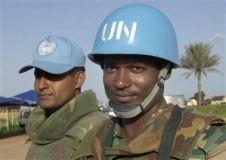UN Security Council to meet Monday on Sudan peacekeeping
Aug 24, 2006 (UNITED NATIONS) — Despite Sudan’s strong opposition, the U.N. Security Council will hold a meeting Monday on the transfer of peacekeeping in Darfur to a U.N. force because of the worsening violence in the region.
 Ghana’s U.N. Ambassador Nana Effah-Apenteng, the council president for August, had hoped that Sudan and other key players in the Darfur crisis would send top officials to New York to discuss the handover from the financially-strapped African Union, which says it cannot handle long-term peacekeeping.
Ghana’s U.N. Ambassador Nana Effah-Apenteng, the council president for August, had hoped that Sudan and other key players in the Darfur crisis would send top officials to New York to discuss the handover from the financially-strapped African Union, which says it cannot handle long-term peacekeeping.
But Sudanese President Omar al-Bashir sent a letter to the council seeking more time to bring peace and asking to delay the council meeting. He stressed the strong opposition of the people and leaders in Darfur to a U.N. force and warned that the U.N.’s takeover would lead to violent confrontations “among all parties in Darfur, including the United Nations forces.”
Sudan’s opposition has left the possibility of a U.N. takeover in limbo because, as Effah-Apenteng stressed, “no member of the council believes that we can introduce a force into Sudan without the cooperation of the government of Sudan.”
Nonetheless, after a closed-door council meeting on Thursday to discuss al-Bashir’s letter, Effah-Apenteng told reporters that members decided to go ahead and hold a private meeting Monday because “we think that the situation in Darfur is so grave that it merits attention.”
He said two of the other key players – the Organization of the Islamic Conference and the Arab League – also said the date was not convenient, but the African Union indicated it would send an official who had worked in Darfur.
Effah-Apenteng said one of the reasons he invited the key players to the meeting on Monday was that he had been told the Sudanese government complained that it had not been able to express its views on a new resolution cosponsored by the U.K. and the U.S. That resolution would authorize a U.N. force of more that 17,000 troops and police to take over from the 7,000-strong A.U. contingent.
“We thought that we were offering them a golden opportunity on Monday to come and talk on the resolution before we took further action,” he said. “We’ll still leave the door open, because…we need everybody to be on board to deal with the situation in Darfur.”
Al-Bashir’s National Congress Party rejected the draft resolution at a meeting Wednesday night.
Lawmaker Ghazi Salah Eldin Atabani said it was “an attempt to impose complete guardianship on the Sudan” and warned that any council member who supported the draft would be considered an enemy of Sudan.
A May peace agreement signed by the government and one of the major rebel groups was supposed to help end the conflict in Darfur. Instead, it has sparked months of fighting between rival rebel factions that has added to the toll of the dead and displaced.
Aid groups, the U.N., and beleaguered A.U. peacekeepers say rebel factions are seeking to gain advantage before peace changes the status quo. More than 200,000 people have been killed and over 2 million have fled their homes since 2003 when ethnic African tribes revolted against the Arab-led Khartoum government.
Poorly equipped and funded A.U. troops, whose mandate expires Sept. 30, have failed to bring security to the area.
More than 200 women have been raped in Kalma refugee camp – one of Darfur’s largest – over the past five weeks alone, the International Rescue Committee aid organization said Wednesday. A day earlier, U.N. Secretary-General Kofi Annan said there were thousands of documented cases of women and children abducted for forced labor and forced sex.
In the letter, Al-Bashir told the council he wants to concentrate on implementing the Darfur Peace Agreement under a six-month plan he already submitted to Annan. He said it calls for the government, in cooperation with the AU and U.N. agencies, to “return the security and humanitarian situation in Darfur to normal.”
Britain’s U.N. Ambassador Emyr Jones Parry countered that “the far better option” is to put a U.N. peacekeeping force on the ground because it would be impartial and better able to provide security for the people.
The government should concentrate on doing what it has assured the council it wanted to do – but so far has not done – which is to disarm the Janjaweed militia, he said.
Jones Parry reiterated that “my sincere wish is that this resolution should be adopted in the month of August.”
(AP/ST)
